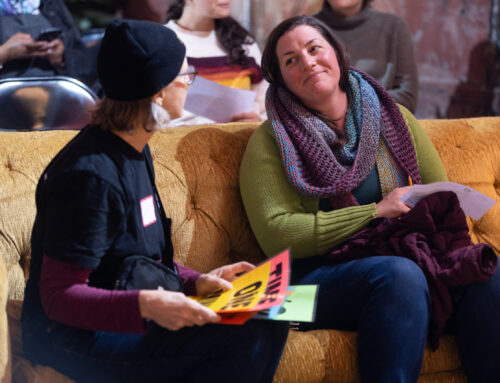Image credit: photo of a poster designed by Terry McGuire, who also produces the Giving Voice to Depression podcast.
I have multiple family members living with mental health conditions. One of them – an adult who I’ll call Riley to protect their privacy – has schizophrenia that is not well managed at present. A few years ago, they complained that it was impossible to find a therapist who had significant experience with schizophrenia. “No one in this city takes my insurance and even if they do, they never have any openings.”
Riley experiences delusions and our conversations tend to be full of hyperbole, so when I heard these complaints, I half dismissed them as excuses and slipped into cheerleader mode. “That’s super frustrating, but keep calling around. Maybe you’ll have to drive out further or wait a few weeks, but don’t give up!”
Turns out, Riley was right. Oops. Actually, there has been a significant shortage of mental health providers for years, and COVID-19 has just increased demand. In fact, the mental health of young people has just been declared a national emergency. There are so many barriers to mental health treatment, and from personal experience, it’s easy to overlook or minimize them.
These days, my interactions with Riley are really sad. Mostly, they send me profanity-laced texts accusing me of gaslighting them and participating in the cover-up of violent crimes. I try to validate their feelings and make them feel heard. I gently ask if they are still doing yoga. I still send birthday cards. But for the most part, I am powerless in this arena – and if you know me well, you know that I HATE this. I’m a person who takes ownership of things, and releasing control is, uh, a struggle.
So instead, I’m throwing my energy into using personal stories for systems change. For example, could we ensure that when someone is having a mental health crisis, we send trained mental health specialists to assist them instead of police officers? What if, back in 2009, Riley wasn’t arrested and thrown into solitary confinement for months?? WHO THOUGHT IT WAS OKAY TO LEAVE A PERSON THAT WAS EXPERIENCING DELUSIONS ALONE WITH THEIR THOUGHTS AND NO ROUTINE?!?!
(deep breath in, deep breath out) I wonder how much that experience escalated things. I can’t change the past, but maybe I can be part of the change that prevents it from happening to someone else.
Three years ago, my exploration of effective mental health storytelling led me to a team that is researching the connection between narratives and stigmatization (https://www.jstor.org/stable/44164855). They shared an interesting finding from an upcoming paper about mental illness and storytelling: when people are coping well with mental illness, their personal stories focus on aspects of treatment that are working well, and they attribute their illness to external factors. This indicates that personal stories about mental illness will be most effective at increasing awareness, eliminating stigma, and promoting access to care IF the narratives avoid any language or content that could be interpreted as self-blaming.
This is where Ex Fabula’s storytelling coaches excel. In workshops, our teaching artists help community members to become more effective storytellers. This includes exercises where storytellers brainstorm stories they can tell, structure their stories, and practice sharing them. Along the way, storytellers receive structured feedback that helps them refine their stories – and for stories about mental health, our coaches can highlight how changes in word choice can help challenge stigma. For example, the words “committed suicide” imply that a sin or crime was committed and places blame on the person that lost their life; instead, many advocates suggest using the term “died by suicide”.
While we’ve previously worked rather informally to bring stories about mental health to the stage, we’re about to do so in a more intentional and comprehensive way as we kick off “Truth Is…” Deepening the Narrative around Depression and Mental Health project. This effort – presented with support from the Charles E. Kubly Foundation and Ex Fabula members – will include storytelling workshops, one-on-one coaching, stories told at public Slams, and further distribution of stories through media partnerships.
To start, we’re partnering with the Grand Avenue Club on some in-person workshops and with NAMI Southeast Wisconsin on a virtual workshop on Wednesday November 10. But hopefully, this is just the beginning – and while we know we have a role to play, we also know we don’t have all the answers. So, if you have additional ideas or suggestions, please contact us.
Please, take good care.
-megan
PS: If you or someone you know is at immediate risk of harm or has harmed themselves: please CALL 911 immediately.
If you are having suicidal thoughts or you are worried about someone you know: call the National Suicide Prevention Lifeline at 1-800-273-8255 or text “HOPELINE” to 741741.





Leave A Comment